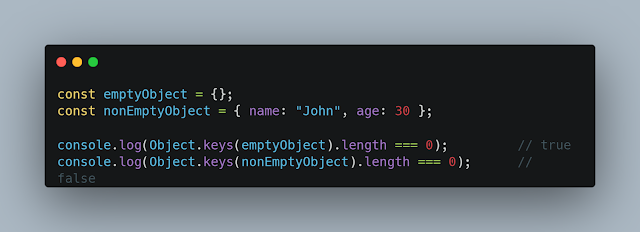Welcome to our blog post on how to check if an object is empty in JavaScript! Whether you're a seasoned developer or just starting out, this is a fundamental question that often arises in JavaScript programming. We're here to simplify the concept and provide you with practical solutions.
So, you've got an object in JavaScript, and you want to know if it's empty. You might be wondering, "How can I efficiently check if an object is empty without writing lengthy code?" Well, you've come to the right place. We'll walk you through the methods, techniques, and even provide you with examples. Let's dive right in!
Understanding an Empty Object
Before we begin exploring how to check for an empty object, let's clarify what an empty object in JavaScript actually is. In JavaScript, an object is considered empty if it has no own properties. In other words, it's like an empty container with nothing inside. Think of it as an empty coffee cup - if there's no coffee in it, it's empty. Simple, right?
Now that we've established what an empty object is, let's get into the methods to check for it.
Method 1: Using the Object.keys() Method
One of the most straightforward methods to check if an object is empty in
JavaScript is by using the Object.keys() method. This method
returns an array containing all the object's own property keys. If the object
is empty, this array will be empty too. Let's create a table to showcase how
to use this method:
| Code Snippet | Description |
|---|---|
Object.keys(obj).length === 0 |
Check if the length of the array is 0. |
Here's an example:
const emptyObject = {};
const nonEmptyObject = { name: "John", age: 30 };
console.log(Object.keys(emptyObject).length === 0); // true
console.log(Object.keys(nonEmptyObject).length === 0); // false
This is like peeking into your coffee cup to see if there's any coffee left.
If it's empty, you'll get a true, and if there's coffee, you'll
get a false.
Method 2: Using a for...in Loop
Another way to check for an empty object is by using a
for...in loop. This loop iterates over an object's properties. If
it doesn't find any properties, the object is empty. Here's a table with the
code snippet:
| Code Snippet | Description |
|---|---|
for (let key in obj) { return false; } |
Iterate through the object's properties and immediately return
false if any property is found.
|
Let's illustrate this with an example:
function isEmptyObject(obj) {
for (let key in obj) {
return false;
}
return true;
}
const emptyObject = {};
const nonEmptyObject = { name: "Alice" };
console.log(isEmptyObject(emptyObject)); // true
console.log(isEmptyObject(nonEmptyObject)); // false
Method 3: Using the JSON.stringify() Method
Our next method to check if an object is empty in JavaScript is a bit unique.
We can use the JSON.stringify() method to convert the object into
a JSON string. An empty object will be converted into an empty string. Here's
the code snippet:
| Code Snippet | Description |
|---|---|
JSON.stringify(obj) === '{}' |
Check if the JSON string is '{}' (empty object). |
Let's see it in action:
const emptyObject = {};
const nonEmptyObject = { name: "Eva", age: 25 };
console.log(JSON.stringify(emptyObject) === '{}'); // true
console.log(JSON.stringify(nonEmptyObject) === '{}'); // false
This method is like turning your object into a piece of paper. If the paper is blank, it's empty; otherwise, it has something written on it.
Method 4: Using Object.getOwnPropertyNames()
For a more specific approach, you can use the
Object.getOwnPropertyNames() method. It returns an array of all
properties that are enumerable, which are properties with their
enumerable attribute set to true. An empty object
will have an empty array of property names. Here's a table with the code:
| Code Snippet | Description |
|---|---|
Object.getOwnPropertyNames(obj).length === 0 |
Check if the length of the array is 0. |
Let's check it with an example:
const emptyObject = {};
const nonEmptyObject = { color: "blue", size: "medium" };
console.log(Object.getOwnPropertyNames(emptyObject).length === 0); // true
console.log(Object.getOwnPropertyNames(nonEmptyObject).length === 0); // false
Method 5: Using the isEmpty() Function from a Library
If you want a more convenient way to check for empty objects, you can use
libraries that provide ready-made functions for this purpose. One such library
is lodash, which provides an isEmpty() function. However,
remember to include the library in your project. Here's an example:
const lodash = require('lodash');
const emptyObject = {};
const nonEmptyObject = { sound: "silence" };
console.log(lodash.isEmpty(emptyObject)); // true
console.log(lodash.isEmpty(nonEmptyObject)); // false
Using a library is like having a specialized tool for a specific task. It simplifies your work and makes it more efficient.
Conclusion
In this blog post, we've explored multiple methods to check if an object is
empty in JavaScript. Whether you're using Object.keys(), a
for...in loop, JSON.stringify(),
Object.getOwnPropertyNames(), or a library like lodash, you now
have a variety of options to choose from.
So, the next time you're dealing with an object in your JavaScript code and you're unsure if it's empty, you can confidently apply these techniques. Remember, each method has its own strengths and use cases, so pick the one that suits your specific needs.
We hope you found this information valuable, and if you have any questions or suggestions, please feel free to share them with us. Thank you for joining us on this journey to understand how to check if an object is empty in JavaScript. Happy coding!
